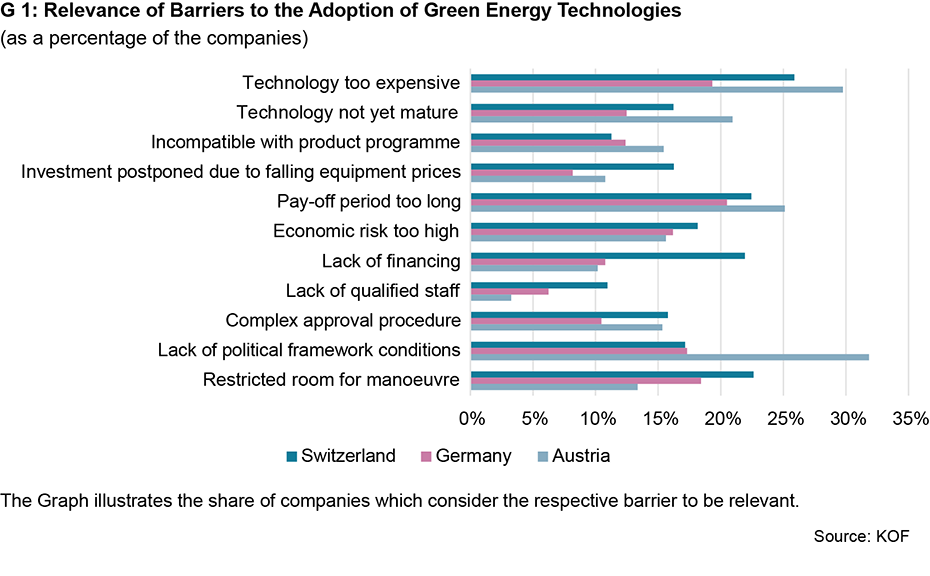Environmental Policy Instruments and Their Impact on Enterprises
- Innovation
- KOF Bulletin
Swiss policy-makers are currently debating a raft of measures designed to adjust the country’s climate policy. Among other factors, the behaviour of enterprises plays an important role in this context. KOF studies have shown that the impact of energy policy measures on companies depends to a large extent on the prices of new energy technologies and on energy costs.

The Council of States’ Environment, Spatial Planning and Energy Commission (UREK-S) has recently presented a external page set of measures designed to adjust Swiss climate policy. Among the proposed measures is a regulatory tax on flight tickets. The Commission would also like to see higher petrol and diesel prices. Moreover, UREK-S plans to introduce a new climate fund whose resources will be used to finance measures ensuring the long-term reduction of CO2 emissions in buildings. The Council of States will debate this legislation during its autumn session, which starts on 9 September.
The selected instruments are predominantly geared towards the behaviour of the general public. However, their medium to long-term effect also depends on their impact on the behaviour of enterprises. Whether or not the legislation will succeed in reducing key barriers to the adoption of green energy technology will be seen once the measures have been formulated and implemented.
Lengthy pay-off periods present a barrier
For Swiss companies, the main barriers are the high price of new energy technologies and long pay-off periods. On top of this, many companies find that a lack of freedom to take their own decisions, for instance in regard of structural changes to buildings, is restricting their room for manoeuvre and decision-making scope.
It is also worth noting that a lack of financing is a much more frequent reason that prevents enterprises from adopting energy-efficient technologies in Switzerland than in Germany or Austria (see G 1). These are the key results of a survey conducted in Austria, Germany and Switzerland in the context of the National Research Programme “Managing Energy Consumption” (NFP 71). The survey focuses on the period 2012 to 2014 (see Box).

In-depth analysis of the effectiveness of energy policy measures have shown that companies which are strongly affected by energy-related taxes and levies, or consider voluntary agreements, public subsidies or demand for energy-efficient products and services as highly relevant were much more likely to adopt new green energy technologies in the period 2012 to 2014. Nevertheless, with the exception of subsidies, these instruments did not have any influence on adoption intensity, i.e. the amount of investment in green energy technologies (see Woerter et al. 2017). The investment amount is however a decisive factor in any significant reduction of the ecological footprint. Subsidies were the most powerful, albeit costly, political instrument employed to raise private investment in energy-efficient technologies.
Energy costs make up no more than 1.4% of turnover
Although the weak impact of most of the instruments on the intensity of energy technology diffusion could be related to the strength of the political impulse, it may be primarily related to the low relative importance of energy costs within the companies. On average, the energy costs of the surveyed enterprises in Switzerland amounted to no more than 1.4% of turnover. It is therefore not surprising that management often focuses on other areas when planning cost-cutting measures. Analysis has shown that internal factors, such as energy intensity, are more relevant to the amount of investments.
Although the companies’ average energy intensity is relatively low, an average of 41% of the enterprises in the three survey countries stated that they had achieved moderate reductions in energy consumption per unit/process thanks to the adoption of green energy technologies. 22% reported significant reductions. In this context, the respondents’ carbon footprint also improved; 26% of the enterprises with new green energy technologies achieved moderate reductions of their CO2 emissions in the period 2012 to 2014, and 17% even recorded significant reductions.
In summary, it may be stated that high prices and excessive pay-off periods are the two main factors preventing Swiss companies from adopting new energy technologies. The impact of energy policy measures also depends to a large degree on the relevance of energy costs within the individual company.
The results are based on a written survey conducted among a representative sample of 5,789 Swiss companies, 6,374 German companies and 7,091 Austrian companies. The samples in each of the three countries were layered according to company size and industry. In Switzerland, the response rate was 31.4%, in Germany 36.4% and in Austria 7.6%. The surveys were conducted simultaneously in all three countries and were based on a uniform questionnaire.
Contact
KOF Konjunkturforschungsstelle
Leonhardstrasse 21
8092
Zürich
Switzerland